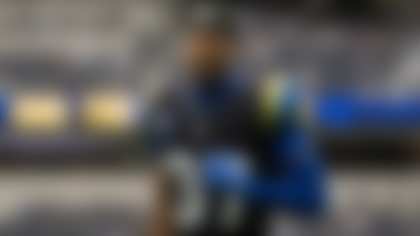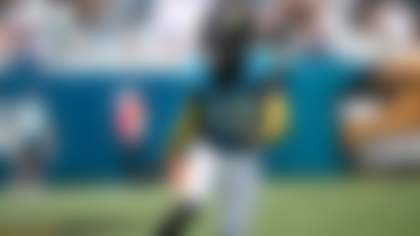Originally printed in the December 2011 issue of NFL MAGAZINE, the official publication of the NFL.
40 years later, the men who played the NFL's longest game, remember it like it was yesterday.
The final act of the 1971 AFC playoff game between Miami and Kansas City was an overtime that lasted 22 minutes and 40 seconds, so it was hardly sudden and since the memory lives on, well, it wasn't exactly death, either.
What it was, really, was a magnificent football game, the longest game in NFL history, a game in which 14 future Hall of Famers shared the stage, including both head coaches (Don Shula and Hank Stram), both quarterbacks (Bob Griese and Len Dawson), and both middle linebackers (Nick Buoniconti and Willie Lanier). It was the rarest of games, one played on such a high level that even some of the losers consider it a career highlight.
Relive the 'The Longest Game Ever'
NFL Network will air an
NFL Films presentation of the 1971 double-OT playoff tilt between the Dolphins and Chiefs on Sunday, Dec. 25 at 6 p.m. ET. **More ...**
If you wanted to pick one game to put in a time capsule, that was the game," Lanier said. "We lost, but walking off the field I didn't feel crushed. I knew I was part of something great, something memorable. The way it ended didn't change that."
Ed Budde isn't so sure. "Willie is more philosophical than I am," said Budde, an All-Pro guard for Kansas City. "Yeah, it was a great game, but I played it to win. Losing, I just felt empty."
The game was played on Christmas Day and became known as The Cold Turkey Game because all across America, holiday dinners were put on hold while millions watched the drama build for 82 minutes and 40 seconds until-finally-Miami's Garo Yepremian brought down the curtain with a 37-yard field goal. The final score was Miami 27, Kansas City 24.
"When I kicked the ball, I knew it was good," Yepremian said, reflecting on that moment 40 years later. "I started to celebrate and I thought, 'Why is it so quiet?' Then I said, 'Oh, we're in Kansas City.' I never heard a stadium so silent."
It was an everlasting silence because that was the last game ever played in Municipal Stadium. As that chapter of Chiefs' history ended so, too, did their era of dominance. The veterans who had won a Super Bowl two years earlier were aging while the Dolphins were a young team on the rise. They passed that day-one franchise going up, the other going down.
Miami went on to win the AFC championship and play in the first of three consecutive Super Bowls. In 1972, the Dolphins became the first NFL team to go unbeaten and untied for an entire season. They repeated as league champions the following year. It was quite a run, and it all started with that Christmas Day marathon in Kansas City.
"We were a big, physical team that bulldozed people," said running back Ed Podolak. "We were built to play on grass. The artificial surface [at Arrowhead] was more for speed. It didn't really suit us."
"We didn't know it at the time but that [playoff game] was it," Budde said. "We had a great team. I think if we had beaten Miami, we would've gone on and beaten Dallas in the Super Bowl. But we lost that game and we were never the same after that."
In the second half, Jim Otis scored to put the Chiefs ahead, but Jim Kiick answered with a touchdown to tie. Podolak scored his second touchdown of the game to put the Chiefs ahead in the fourth quarter but Griese threw a touchdown pass to tight end Marv Fleming to even the score with 1:36 remaining in regulation time.
"The Chiefs should have put us away early," Griese said. "They had their chances, but they made mistakes and let us hang around. We were able to stay within striking distance. The longer it went, the more confident we got."
The game almost ended on the kickoff following Fleming's touchdown. Podolak, who accounted for 350 combined net yards in the game, received the ball. He broke free and appeared on his way to a touchdown, but Yepremian got in the way just enough to make him change direction, which allowed Curtis Johnson to catch him from behind.
"I've seen the replay many times," said Podolak, whose yardage total was an NFL postseason record. "I look to see if there is anything I could have done anything differently. Really, there isn't."
It is one of the painful ironies of that game: The only kicking specialist enshrined in the Pro Football Hall of Fame had his worst day in a game that will be talked about forever. Stenerud told John Underwood of Sports Illustrated the game was "the worst thing that ever happened to me."
"I felt sorry for Jan," Budde said. "He's a great guy who won a lot of games for us. He missed a kick. I missed blocks; other guys fumble or drop passes. We all make mistakes. None of us blamed Jan. It's football, stuff happens."
The game dragged on into a sixth quarter. "At one point, I was at the bottom of a pile face-to-face with Nick [Buoniconti]," Podolak said. "It was like the thirty-fifth time we ran into each other. I asked him, 'Do you think this will ever end?' He just grunted."
The game did not end until the third possession of the second overtime, when Larry Csonka broke away on a 29-yard run-a great misdirection play called by Griese-to put the Dolphins in field-goal position.
"I wasn't nervous," Yepremian said. "My only concern was the field. It was in terrible shape. Because it was the last season in that stadium they let [the field] go. It was all dirt and sand but they painted it green so it looked like grass on TV.
"I went through all the usual things in my mind: 'Head down. Kick the ball. Follow through.' The lights in the stadium were not good, so it was dark, almost like nighttime. I just wanted to kick the ball and go home."
Yepremian's kick was perfect and as he raised his arms to the heavens, he saw Don Shula bounding toward him.
"It was the biggest smile i've ever seen on Coach Shula's face," Yepremian said. "I have the video [of the kick] on my iphone, but that memory I keep in my heart."
A few months later, Willie Lanier was invited to a dinner at the White House. When he met President Nixon in the receiving line, Nixon, a huge football fan, asked: "That playoff game, the double-overtime, didn't you get tired?"
"It told me what a big game it was that the President was still talking about it," Lanier said. "I told him, 'Mr. President, you could never get tired playing in a game like that."
To subscribe to NFL MAGAZINE, the official publication of the NFL, click here.



